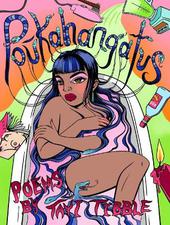
|
Poukahangatus
Paperback / softback
Main Details
| Title |
Poukahangatus
|
| Authors and Contributors |
By (author) Tayi Tibble
|
| Physical Properties |
| Format:Paperback / softback | | Pages:80 |
|
| Category/Genre | Poetry
Poetry by individual poets |
|---|
| ISBN/Barcode |
9781776561926
|
| Classifications | Dewey:821.92 |
|---|
| Audience | |
|---|
|
Publishing Details |
| Publisher |
Te Herenga Waka University Press
|
| Imprint |
Victoria University Press
|
| Publication Date |
12 July 2018 |
| Publication Country |
New Zealand
|
Description
This collection speaks about beauty, activism, power and popular culture with compelling guile, a darkness, a deep understanding and sensuality. It dives through noir, whakama and kitsch and emerges dripping with colour and liquor. There's whakapapa, funk (in all its connotations) and fetishisation. The poems map colonisation of many kinds through intergenerational, indigenous domesticity, sex, image and disjunction. They time-travel through the powdery mint-green 1960s and the polaroid sunshine 1970s to the present day. Their language and forms are liquid-sometimes as lush as what they describe, other times deliberately biblical or oblique. It all says: here is a writer who is experiencing herself as powerful, restrained but unafraid, already confident enough to make a phat splash on the page. -Hinemoana Baker
Author Biography
Tayi Tibble (Te Whanau a Apanui/Ngati Porou) was born in 1995 and lives in Wellington. In 2017 she completed a Masters in Creative Writing from the International Institute of Modern Letters, Victoria University of Wellington, where she was the recipient of the Adam Foundation Prize. Poukahangatus is her first book.
ReviewsThis collection speaks about beauty, activism, power and popular culture with compelling guile, a darkness, a deep understanding and sensuality. It dives through noir, whakama and kitsch and emerges dripping with colour and liquor. There's whakapapa, funk (in all its connotations) and fetishisation. The poems map colonisation of many kinds through intergenerational, indigenous domesticity, sex, image and disjunction. They time-travel through the powdery mint-green 1960s and the polaroid sunshine 1970s to the present day. Their language and forms are liquid - sometimes as lush as what they describe, other times deliberately biblical or oblique. It all says: here is a writer who is experiencing herself as powerful, restrained but unafraid, already confident enough to make a phat splash on the page." - Hinemoana Baker
|